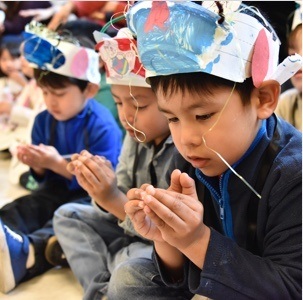
Photo Courtesy of Association to Benefit Children
Children are more likely to live in poverty than any other group; in New York City, 22% of those under the age of 18 are living in poverty.
-The CEO Poverty Measure, 2005-2016, distributed in April 2018
Funding Guidelines
Youth & Families

Photo Courtesy of Association to Benefit Children
Tiger Foundation’s investments in support of Youth and Families are dedicated to comprehensive, long-term approaches to breaking the cycle of poverty. In this funding portfolio, we focus on three critical areas:
- Helping young children (birth to age 5) develop the academic and social skills necessary to succeed in school
- Preventive support for vulnerable youth to stay on track to independent adulthood
- Building strong families
Nearly half of low-income children start first grade two years behind their peers. Tiger Foundation believes that intervening during the first five years of life for children born into poverty and high-risk environments is critical. The earlier a child is afforded opportunities for positive development, the greater the chances of long-term success. We invest in efforts to support young children both in their homes and in community-based centers and/or classrooms, funding programs that ensure children are school-ready by kindergarten and that provide parents with the tools and knowledge to support their children's age-appropriate cognitive and social/emotional development. We consider the following areas when assessing program success:
- Pre- and post-tests demonstrating improved academic and social/emotional functioning
- Early testing for and progress in addressing developmental delays
- The development of strong & supportive parent-child attachment and relationships
- Diversion from special education programs
With high school graduation rates hovering around 70% (lower for boys and students of color) there are many young New Yorkers who are at risk of dropping out of school and embarking on the challenging path of seeking meaningful employment without academic credentials. We work with organizations that provide positive guidance for youth by discouraging high-risk behaviors, such as drug-use and too-early parenting, and support programs that help young people achieve educational goals and become engaged in the labor force. We do this work through support of a network of in-school and out-of-school programs, which work with young people on an ongoing basis over multiple years. Programs under consideration are expected to present evidence of outcomes such as:
- Successful recruitment and retention of participants
- Improved academic performance (e.g., grades, school attendance, high school graduation, HSE, college enrollment and persistence)
- Access to employment training and acquisition of jobs and/or internships
- Access to caring adult relationships
- Decreases in or avoidance of alcohol/substance use
- Avoidance of criminal justice system involvement
- Prevention of early parenting
- Independent living (e.g., stable housing, bank accounts)
- Resolution of child care, health, and mental health needs
A crucial component of the foundation’s mission is to provide assistance to low-income families working to maintain productive and healthy lives. We do this through support of reunification programs for families with children in the foster care system and through the funding of multi-service case management programs to help parents access the supports needed to provide for their children and to keep families together. We seek organizations able to document their success with families as they work to improve the opportunities available to both parents and children. Organizations seeking to demonstrate the effectiveness of their programs for the families they serve should be able to present data indicating that conditions such as the following have been achieved:
- The development of parenting skills and behaviors that support healthy child development
- Access to safe and affordable housing that is appropriate for a family’s size and composition
- Access to and engagement in employment readiness and job training programs
- Consistent and reliable paid employment
- Sufficient understanding of how to allocate the family’s resources and plan for the future
- Access to reliable and quality child care
- Absence or prevention of ACS reports
- Re-unification with children that have been in foster care
- Regular school attendance for school-age children
- Enrollment in counseling for substance abuse, domestic violence, or other issues
- Access to medical insurance and medical care when needed
- Commitment and attention to appropriate care of children (e.g., immunizations, hygiene)